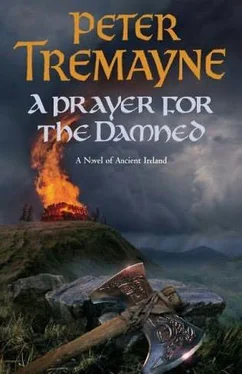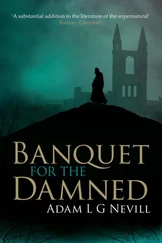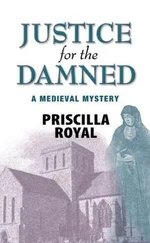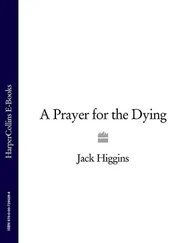Peter Tremayne - A Prayer for the Damned
Здесь есть возможность читать онлайн «Peter Tremayne - A Prayer for the Damned» весь текст электронной книги совершенно бесплатно (целиком полную версию без сокращений). В некоторых случаях можно слушать аудио, скачать через торрент в формате fb2 и присутствует краткое содержание. Жанр: Исторический детектив, на английском языке. Описание произведения, (предисловие) а так же отзывы посетителей доступны на портале библиотеки ЛибКат.
- Название:A Prayer for the Damned
- Автор:
- Жанр:
- Год:неизвестен
- ISBN:нет данных
- Рейтинг книги:4 / 5. Голосов: 1
-
Избранное:Добавить в избранное
- Отзывы:
-
Ваша оценка:
- 80
- 1
- 2
- 3
- 4
- 5
A Prayer for the Damned: краткое содержание, описание и аннотация
Предлагаем к чтению аннотацию, описание, краткое содержание или предисловие (зависит от того, что написал сам автор книги «A Prayer for the Damned»). Если вы не нашли необходимую информацию о книге — напишите в комментариях, мы постараемся отыскать её.
A Prayer for the Damned — читать онлайн бесплатно полную книгу (весь текст) целиком
Ниже представлен текст книги, разбитый по страницам. Система сохранения места последней прочитанной страницы, позволяет с удобством читать онлайн бесплатно книгу «A Prayer for the Damned», без необходимости каждый раз заново искать на чём Вы остановились. Поставьте закладку, и сможете в любой момент перейти на страницу, на которой закончили чтение.
Интервал:
Закладка:
In spite of the illustrious company, so far as Fidelma was aware, there had been no fled cro lige — the feast of the deathbed — performed. And although when a great man died the watching, the aire , would usually take several days and nights, while lamentations were sung round the corpse, Ultán’s body had not even been watched over for a minimum full day and night. When Fidelma asked her brother why this was, Colgú had merely shrugged and said it had been the desire of Brother Drón acting on behalf of the community of Cill Ria.
As they stood in the gloom among the graves, ogham-inscribed pillar stones marking the more distinguished burials, there came the slow rhythmic toll of a handbell approaching down the hill. It was the clog-estechtae , the death bell. The bellringer, a young man in dark robes, preceded the shadowy forms of four pallbearers who carried the wooden fuat or bier on which the body was laid, wrapped in a rochell or winding sheet. The small group entered the graveyard to the ringing of the bell and came to a halt by the head of the dark hole in the ground. The grave had already been measured and dug.
There was a silence.
The bellringer looked round nervously. No one in the crowd was moving. He cleared his throat.
‘Who is delivering the écnaire?’ he asked, puzzled when no one came forward. ‘Who will deliver the requiem and perform the services?’
There was an uncomfortable shuffling among the religious, and then Brother Drón stepped forward angrily.
‘I will do so!’ he snapped, glaring meaningfully at Abbot Ségdae. ‘My abbot was a great man and deserves better than this.’
‘Your abbot came here as a stranger among us,’ replied Abbot Ségdae, his voice quiet but authoritative. ‘There is no religious of rank here who knew him other than as a man of belligerence and argument. None is therefore fit to deliver the écnaire over his grave. So say what you will, Brother Drón, and we will not deny you.’
Brother Drón turned sharply to where the hawk-faced king of Ulaidh stood by, watching the proceedings with dark, bright eyes which sparkled in the lantern light.
‘And you, king of Ulaidh, do you allow this insult to a churchman of your kingdom to go unnoticed?’
The unease among the people grew a little. Blathmac turned mildly to Brother Drón.
‘I see and hear no insult, Brother Drón. I hear a logical reason why no one of this company is qualified to speak of Ultán’s life and work save only yourself. If you do not wish to do so then let the strophaiss cover the bier and let it be placed in the ground, for the hour grows late.’
Brother Drón swallowed hard. He stared angrily round at the company and then stepped forward and clapped his hands several times in the traditional way of starting the ceremony.
‘I lament for the departed soul of Ultán, pillar of the church and fist of the Faith, who. .’
‘Who was a thief, murderer and man of evil!’ shouted a harsh voice.
A figure pushed itself through the crowd on the far side of the grave from where Fidelma and Eadulf were standing.
It was Brother Berrihert. There was a shocked silence at his intervention.
‘Let the truth be known of the evil that this man has committed. And let no one rhapsodise his misbegotten life by claiming that he may be numbered among the saints.’
Brother Drón was’ speechless for the moment.
‘How dare you,’ he finally gasped. ‘What Saxon sacrilege is this?’
‘Truth is no sacrilege!’ cried Brother Berrihert. ‘Let these people hear the truth. He was evil. He was the murderer of my mother!’
One of the two sisters, Fidelma was not sure whether it was Sétach or Marga, let forth a wailing moan. She saw one of them turn and cling to the other as if for comfort. She glanced at Eadulf and met his astonished gaze. He shook his head as if to say that this was something unknown to him.
Brother Berrihert had advanced with an outstretched hand pointing to Brother Drón.
‘You, too, Drón, have espoused and shared that evil creature’s guilt. I come here to spit on this grave and to curse Ultán’s soul on its journey into everlasting darkness. As for you, Drón, may the fé soon measure your own corpse!’
There was a gasp of horror from the assembly. By the time they had recovered from the shock of hearing the curse uttered aloud — for the aspen rod used to measure graves was believed by many to bring evil on any who touched it — Brother Berrihert seemed to have vanished in the darkness.
Eadulf bent towards Fidelma. ‘That outburst might explain the strange encounter I had with Brother Berrihert’s father, Ordwulf, this morning. I knew that the mother had died but I had not realised that the death was claimed as murder.’
Fidelma nodded thoughtfully.
‘We must speak with Berrihert and Ordwulf,’ she replied.
The assembly was now in disarray. Colgú stepped forward, taking control.
‘Let the fuat be lowered into the grave,’ he instructed sharply. ‘Let those who wish to say a prayer for the repose of this man’s soul do so. But there are many here who feel that there are questions that have to be asked and answered before we can praise or condemn this man. God will forgive us if we delay until that time.’
The High King Sechnassach had been speaking to Blathmac of Ulaidh and now turned, nodding approval.
‘It is well ordered, Colgú,’ he said loudly, so that Brother Drón could be left in no doubt of his approval. ‘Let us retire.’
The crowd began to disperse with the exception of the pallbearers, Brother Drón, and his female companions, Marga and Sétach. Eadulf was about to move when Fidelma stayed him with her hand.
‘It would be unseemly to leave,’ she whispered.
Eadulf suddenly realised that the brehons were remaining too. It was their duty also to do so.
Fidelma waited while Brother Drón quickly intoned a series of prayers for the dead. She noticed that it was Sister Marga, who looked fairly young, who seemed to be sobbing uncontrollably. Sister Sétach had her arms round the slighter girl and was giving her what comfort she could, almost like a mother comforting a child. Finally, Brother Drón had finished and the pallbearers lowered the fuat into the ground. The traditional branches of birch and broom were laid over it before they began to fill in the earth.
Fidelma and Eadulf waited until Brother Drón and his party had left in the company of Brehon Ninnid. Then they moved across to join Barrán and Baithen and walk with them back up the hill to the fortress gates.
‘I have attended many a funeral,’ were Brehon Barrán’s opening words, ‘but this was the most bizarre.’
‘If proof were needed that Abbot Ultán was not well liked, it has been amply demonstrated,’ replied Fidelma mildly.
‘Yet only Muirchertach was seen leaving his chamber,’ chimed in Brehon Baithen, obviously thinking that Fidelma would use the almost universal feeling against the abbot in her defence of the Connacht king.
‘It is true. Yet we cannot proceed without knowing all the facts about the enmities that Abbot Ultán stirred up.’
‘No matter what anger he created,’ Brehon Baithen said, ‘it does not excuse his murder. We are dealing with law.’
‘Let us also hope that we are also dealing with justice,’ responded Fidelma sharply.
‘Well, I shall ensure that after what we have witnessed, a guard is placed outside Brother Drón’s chamber,’ remarked Brehon Baithen. ‘We would not want that curse to become reality. I thought this Saxon Brother Berrihert was a friend of yours, Eadulf? Does he not know that he has offended against our law of hospitality?’
Читать дальшеИнтервал:
Закладка:
Похожие книги на «A Prayer for the Damned»
Представляем Вашему вниманию похожие книги на «A Prayer for the Damned» списком для выбора. Мы отобрали схожую по названию и смыслу литературу в надежде предоставить читателям больше вариантов отыскать новые, интересные, ещё непрочитанные произведения.
Обсуждение, отзывы о книге «A Prayer for the Damned» и просто собственные мнения читателей. Оставьте ваши комментарии, напишите, что Вы думаете о произведении, его смысле или главных героях. Укажите что конкретно понравилось, а что нет, и почему Вы так считаете.












